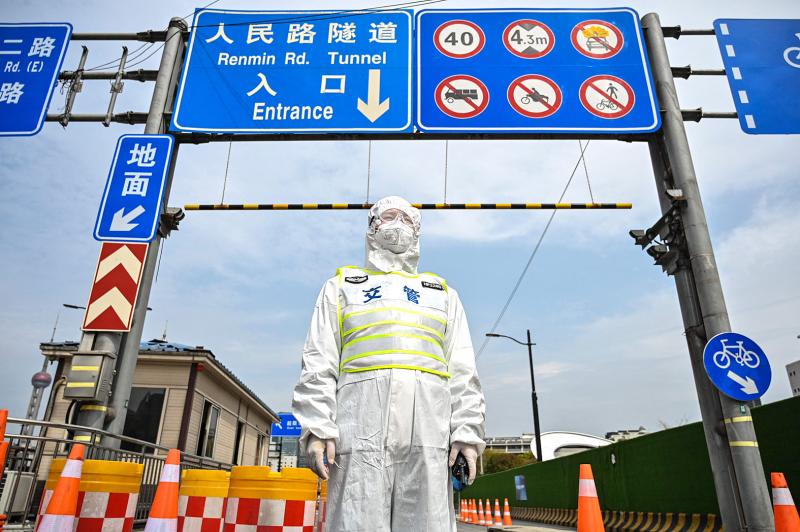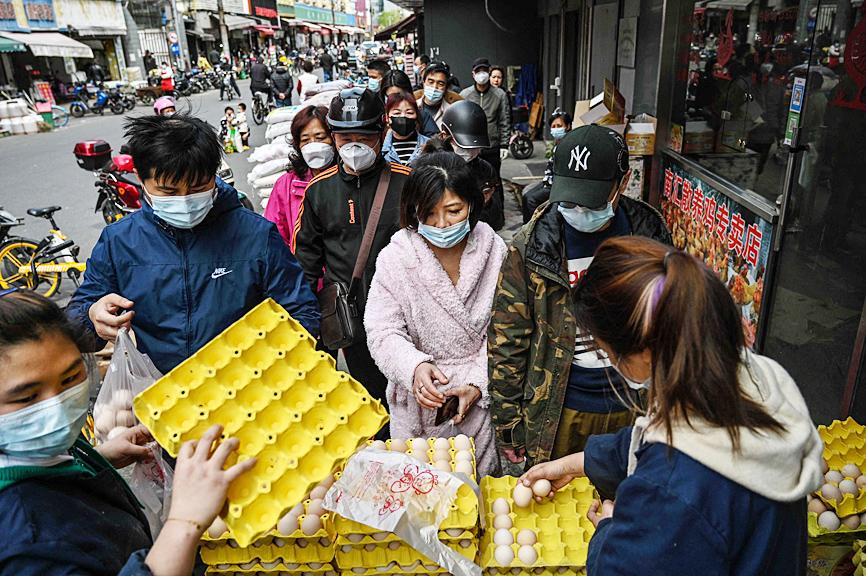Millions of people in Shanghai were yesterday confined to their homes as the eastern half of China’s financial hub went into lockdown to curb the country’s biggest ongoing COVID-19 outbreak.
The move, announced late on Sunday, caused a run on grocery stores by residents who have become exasperated with authorities’ inability to snuff out the outbreak despite nearly three weeks of increasingly disruptive measures.
Authorities are imposing a two-phase lockdown of the city of about 25 million people to carry out mass testing.

Photo: AFP
The government had sought to avoid the hard lockdowns regularly deployed in other Chinese cities, opting instead for rolling localized lockdowns to keep Shanghai’s economy running.
However, the city has in the past few weeks become China’s COVID-19 hot spot, and yesterday reported another record high, with 3,500 new confirmed cases.
The area locked down yesterday is the sprawling eastern district known as Pudong, which includes the main international airport and glittering financial center.

Photo: AFP
The lockdown is to last until Friday, then switch to the more populated western Puxi section, home to the historic Bund riverfront.
The government said the steps were intended to root out infections “as soon as possible.”
The unpredictable neighborhood-level measures employed in the past few weeks have left many citizens frustrated with repeated brief confinements at home.
Some complained that only several hours’ notice was given for the new, larger lockdown.
“We really don’t understand Shanghai’s management and control measures. There has indeed been some inconsistency,” said a 59-year-old man who gave only his surname Cao as he lined up to buy groceries.
“After so much time, [the city] is not controlling the virus and the numbers are still going up,” he added.
China largely kept the virus under control for the past two years through strict zero-tolerance measures including mass lockdowns of cities and provinces for even small numbers of cases.
The Omicron variant of SARS-CoV-2 has proven harder to stamp out.
China has reported several thousand new daily cases for the past two weeks. Those numbers remain insignificant globally, but are up sharply from fewer than 100 per day last month.
Tens of millions of residents in affected areas across China have been subjected to citywide lockdowns in response, but as Shanghai has struggled, some cities have made progress.
The southern tech manufacturing hub Shenzhen — which locked down earlier in the current outbreak — announced that normal business activity was resuming as new cases have fallen.
One Shanghai resident wrote on the popular Sina Weibo microblog of being in and out of neighborhood lockdowns several times recently.
“Now even peoples’ basic livelihood has become a problem. Those who aren’t locked down fight for food, and those who are sit up all night trying to order food on apps,” the post said.
Some posts complained of the effect on older residents who might not know how to order online, while others accused Shanghai — which is envied by other cities for its wealth and cosmopolitan image — of putting its desire to maintain normality over health concerns.
Chinese authorities have watched nervously as a deadly Hong Kong Omicron surge sparked panic buying and claimed a high toll of unvaccinated older residents before later surging in mainland China.

‘EYE FOR AN EYE’: Two of the men were shot by a male relative of the victims, whose families turned down the opportunity to offer them amnesty, the Supreme Court said Four men were yesterday publicly executed in Afghanistan, the Supreme Court said, the highest number of executions to be carried out in one day since the Taliban’s return to power. The executions in three separate provinces brought to 10 the number of men publicly put to death since 2021, according to an Agence France-Presse tally. Public executions were common during the Taliban’s first rule from 1996 to 2001, with most of them carried out publicly in sports stadiums. Two men were shot around six or seven times by a male relative of the victims in front of spectators in Qala-i-Naw, the center

Incumbent Ecuadoran President Daniel Noboa on Sunday claimed a runaway victory in the nation’s presidential election, after voters endorsed the young leader’s “iron fist” approach to rampant cartel violence. With more than 90 percent of the votes counted, the National Election Council said Noboa had an unassailable 12-point lead over his leftist rival Luisa Gonzalez. Official results showed Noboa with 56 percent of the vote, against Gonzalez’s 44 percent — a far bigger winning margin than expected after a virtual tie in the first round. Speaking to jubilant supporters in his hometown of Olon, the 37-year-old president claimed a “historic victory.” “A huge hug

Two Belgian teenagers on Tuesday were charged with wildlife piracy after they were found with thousands of ants packed in test tubes in what Kenyan authorities said was part of a trend in trafficking smaller and lesser-known species. Lornoy David and Seppe Lodewijckx, two 19-year-olds who were arrested on April 5 with 5,000 ants at a guest house, appeared distraught during their appearance before a magistrate in Nairobi and were comforted in the courtroom by relatives. They told the magistrate that they were collecting the ants for fun and did not know that it was illegal. In a separate criminal case, Kenyan Dennis

The US will help bolster the Philippines’ arsenal and step up joint military exercises, Manila’s defense chief said, as tensions between Washington and China escalate. The longtime US ally is expecting a sustained US$500 million in annual defense funding from Washington through 2029 to boost its military capabilities and deter China’s “aggression” in the region, Philippine Secretary of Defense Gilberto Teodoro said in an interview in Manila on Thursday. “It is a no-brainer for anybody, because of the aggressive behavior of China,” Teodoro said on close military ties with the US under President Donald Trump. “The efforts for deterrence, for joint resilience